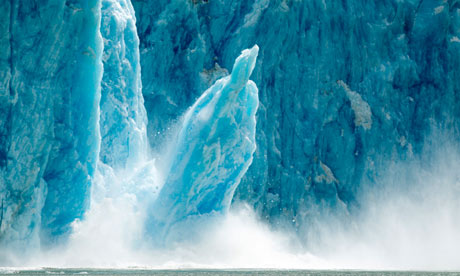
The Intergovernmental Panel on Climate Change has just released its latest summary of the science behind human-caused climate change or, to use its catchy slip-off-the-tongue full title, the IPCC Working Group 1 Fifth Assessment Report Summary for Policy Makers - Climate Change 2013: The Physical Science Basis.
The SPM - as it's known - is put together by the United Nations body the IPCC and summarises what's in the main Climate Change 2013: The Physical Science Basis report that's scheduled for release on Monday.
You'll read, listen, watch and consume oodles of material about this report in the coming hours and days, but here's something nobody else will provide.
A dizzying list of numbers about the report and what's in it, curated in numerical order.
Genius, eh?
0.85 - the amount in degrees Celsius that the world's land and oceans warmed between 1880 and 2012.
3.7 - the amount in Celsius of extra global surface warming we will likely get between 2081 and 2100 if greenhouse gas emissions stay roughly on their current path.
14 - the number of chapters in the full Climate Change 2013: The Physical Science Basis report. Australian scientists feature as authors in 11.
19 - the amount in centimetres the world's oceans have risen between 1901 and 2010.
36 - the number of pages in the summary document.
39 - the number of countries represented in the list of authors and review editors for the full report.
40 - the percentage rise in the concentration of carbon dioxide in the atmosphere between the years 1750 and 2011.
55 - the number of countries represented in the list of expert reviewers.
63 - the amount in centimetres of extra sea level rise we will likely get between 2081 and 2100 if greenhouse gas emissions stay roughly on their current path.
90 - the percentage of the extra energy in the climate system between 1971 and 2010 that has been taken up by warming oceans.
209 - the number of lead authors who worked on the full report.
600+ - the number of contributing authors to the full report.
1089 - the number of self-appointed expert reviewers of the full report.
1250 - the number of figures (that's charts, graphs and other eye candy) contained in the full report.
2000+ - the number of pages in the full draft of Climate Change 2013: The Physical Science Basis.
9,200 - the number of scientific publications cited in the full report.
54,677 - the number of comments made on the full report by the group of self-appointed expert reviewers.
1,400,000 - the number of words in the full report.
2,000,000+ - the amount in gigabytes of numerical data gathered from computers running models of the world's climate systems.
30,000,000,000 - the tonnes of ice that "likely" melted from the Antarctic Ice Sheet on average each year from 1992 to 2001.
34,000,000,000 - the tonnes of ice that "very likely" melted each year on average from the Greenland Ice Sheet between 1992 and 2001.
147,000,000,000 - the tonnes of ice that "likely" melted from the Antarctic Ice Sheet on average each year from 2002 to 2011.
215,000,000,000 - the tonnes of ice that "very likely" melted on average each year from the Greenland Ice Sheet between 2002 and 2011.
275,000,000,000 - the amount of ice in tonnes per year which "very likely" melted from the world's glaciers between 1993 and 2009.
1,339,000,000,000 - the tonnes of carbon dioxide added to the atmosphere from fossil fuel and cement production between 1750 and 2011.
2,000,000,000,000 - the tonnes of carbon dioxide added to the atmosphere from fossil fuel burning, cement production, deforestation and land clearing between 1750 and 2011. That's 2 trillion tonnes folks.
Finally, as with pretty much all climate change science, these numbers come with caveats and ranges of uncertainty which are outlined in the report itself.
And finally finally, the report doesn't consider the impact of all of these changes on human societies and the planet's ecosystems - arguably the real issue. So one final number.
184 - number of days until the next IPCC report looking at the impact of climate change on human societies and the planet's ecosystems.







